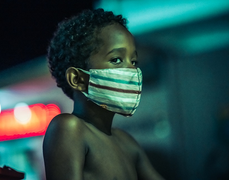"Wir würden lieber an Covid-19 sterben als an Hunger" - Studie zur Lockdown-Stringenz in fünf afrikanischen Ländern [26.09.21]
Viele Menschen in den ärmsten Ländern der Welt stehen vor harten und schwierigen Entscheidungen: Gehen sie arbeiten und riskieren an COVID-19 zu sterben, oder bleiben sie zuhause und riskieren an Hunger zu sterben?Originalpublikation
Birner, R.(1) , Blaschke, N.(1) , Bosch, C.(1) , Daum, T.(1) , Graf, S.(1) , Güttler, D(1) ., Heni, J.(1) , Kariuki, J.(1) , Katusiime, R.(1) , Seidel, A.,(1) Senon, Z.N. (2), Woode, G (1) (2021) ‘We would rather die from Covid-19 than from hunger’ - Exploring lockdown stringencies in five African countries. Global Food Security, Volume 31, 100571
- Institute of Agricultural Sciences in the Tropics (Hans-Ruthenberg-Institute), University of Hohenheim, Wollgrasweg 43, Stuttgart, 70599, Germany
- Regional Agency of Agricultural Development-Plateau, Ministry of Agriculture, Livestock and Fishery, Benin.
Abstract
Facing COVID-19, African countries were confronted with a dilemma: enacting strict lockdowns to “flatten the curve” could potentially have large effects on food security. Given this catch-22 situation, there was widespread concern that Africa would suffer most from the pandemic. Yet, emerging evidence in early 2021 showed that COVID-19 morbidity remained low, while “biblical famines” have been avoided so far. This paper explores how five African countries maneuvered around the potentially large trade-offs between public health and food security when designing their policy responses to COVID-19 based on a content analysis of 1188 newspaper articles. The findings show that food security concerns played an important role in the public policy debate and influenced the stringency of lockdowns, especially in more democratic countries. © 2021 The Authors
Author keywords
Africa; COVID-19; Food security; Lockdown; Policy discourse


